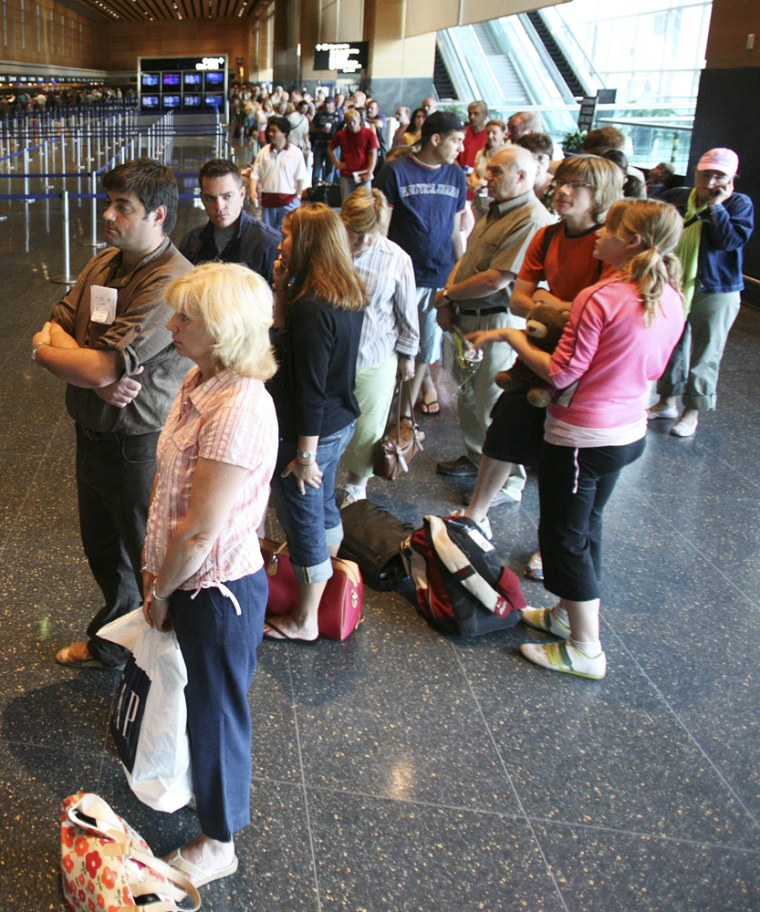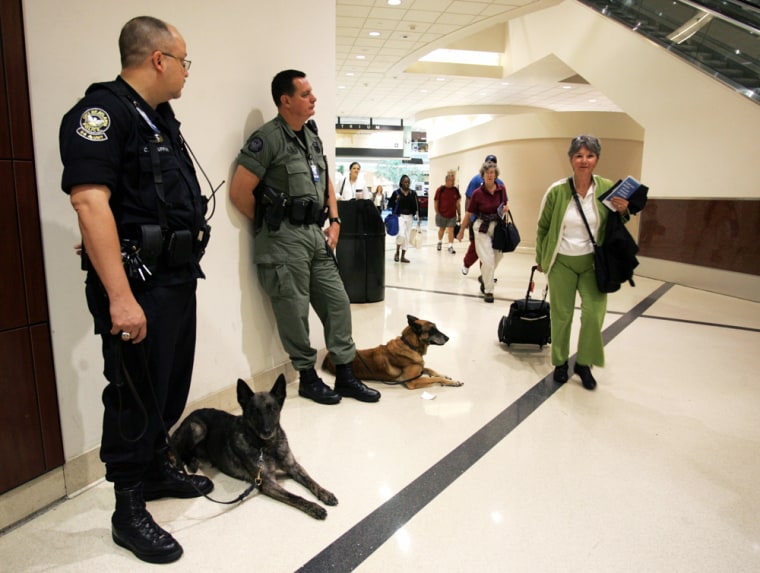Airlines scrambled to recruit more baggage handlers Friday as U.S. travelers quickly adapted to new security measures by simply checking luggage they normally would have carried with them.
Passengers also faced a second level of security checks starting Friday, with random bag searches at the airline gates.
The new rules, including a prohibition on carrying liquids aboard aircraft, were hastily added early Thursday after British authorities arrested 24 people in an alleged plot to blow up U.S.-bound planes by using explosives disguised as common liquids and other items.
In response, the Bush administration issued an unprecedented code-red alert for passenger flights from Britain to the United States.
This code remained in effect on Friday, and all other flights to and within the United States remained under an “orange” alert, one step below red, but still an escalation from the “yellow” status that had been in effect before Thursday.
Homeland Security Secretary Michael Chertoff said investigators had uncovered no signs of U.S.-based terrorists linked to the airliner plot, and said his department was looking to adjust some of the new traveling restrictions to “somewhat reduce any additional inconvenience.” He provided no details.
“I don’t want to suggest that they’re going to be earth-shattering, but we’re going to move to try to make this as simple and as easy as possible, as quickly as possible,” he said in a news conference at Reagan National Airport in Washington.
Passengers expect new rules
Unlike Thursday, when travelers unaware of the just-established rules filled trash cans at security checkpoints with now-banned bottles of makeup, perfume and suntan lotion, passengers on Friday had already packed those items in their checked luggage instead.
As a result, security checkpoint lines that had stranded people for hours on Thursday were moving normally at most airports Friday.
“The overhead bins have never been that empty, ever,” Kim Dickerson, 40, said after she arrived at Chicago’s O’Hare International Airport from New York. “Normally people are trying to shove and push things around, I tell you, half the bins weren’t even occupied.”
Los Angeles International Airport reported a 30 to 50 percent increase in checked luggage, a jump that required airlines to recruit additional bag handlers, said Paul Haney, spokesman for Los Angeles World Airports. To handle the random bag checks at airport gates, about 200 unarmed National Guard troops were on duty.
“This time yesterday we were collecting hourly all kinds of liquids and gels. Obviously, the word has gotten out not to pack that,” Haney said. “It’s looking very much like a normal Friday in August.”
Operations at Chicago’s O’Hare, the nation’s busiest airport, were also back to normal, with security line waits between 30 and 60 minutes, said Transportation Security Administration spokeswoman Lara Uselding.
“Things are running very well for a Friday” at O’Hare, said United Airlines spokeswoman Robin Urbanski.
Delays, missed flights
Security was tightest on flights to and from the United Kingdom, where more items were banned and passengers faced additional luggage checks.
Incoming flights from London were delayed about 50 minutes at O’Hare, Urbanski said Friday morning. At Miami International Airport, some long lines formed ahead of the early international departures Friday, but they quickly cleared out, airport spokesman Greg Chin said.

Despite the threat and added security hoops to get through, Urbanski said travelers didn’t appear to be ditching their flight plans. “We are not seeing any change in bookings ... nothing out of ordinary,” she said.
At Seattle-Tacoma International Airport, about 3,700 of an estimated 51,000 travelers had missed their flights because of lines and delays on Thursday, when 164 flights were delayed, said airport spokesman Bob Parker.
Traffic was moving more smoothly at New York’s major airports on Friday, where the morning flight delays were generally no more than 15 minutes, said Tiffany Townsend, a spokeswoman for the Port Authority of New York and New Jersey.
Filling dumpsters
From London to Los Angeles, travelers on Thursday had found themselves unpacking carry-on bags on the floor in the terminals. Some tried to squeeze makeup, sunscreen and other toiletries into their checked baggage, where liquids were permissible. Others filled up the bins at security checkpoints, abandoning everything from nail polish to a bottle of tequila.
On Friday, travelers weren’t taking chances.
“I checked everything except for books and a wallet,” Cindy Mironovich, 49, said as she munched on a peach before going through security at Newark Liberty Airport in New Jersey.
The only exceptions to the ban on liquids, lotions and gels were for baby formula and medications, which had to be presented for inspection at security checkpoints. Liquids were allowed in checked bags because those suitcases are screened for explosives and are stowed out off passengers’ reach.
National Guard troops deployed
Other security measures were also ramped up at airports. Governors in Massachusetts, California and New York sent National Guard troops to major airports in their states. Search dogs and officers carrying machine guns still patrolled the Miami airport Friday.
At Boston’s Logan Airport, weary National Guardsmen were one of the few signs anything was different Friday morning.
The last time members of the National Guard were deployed at Logan was October 2001, after two flights from the airport hit the World Trade Center on Sept. 11. The guard’s mission ended in March 2002.
Massachusetts Gov. Mitt Romney told about 50 guard members at the airport that he didn’t expect this mission to be as lengthy: Only “until TSA and the airlines can get their resources up to a level where they can handle the gate-check area ... and you’ll be able to return home to your families and to your regular jobs.”
‘The hassle factor’
While plots to blow up airliners using liquid explosives are nothing new — such an attempt was foiled more than a decade ago — the government has been slow to upgrade its security equipment at airport checkpoints so that it can detect explosives on passengers.
Transportation Security Administration chief Kip Hawley said the need to tighten security came as a surprise and the changes were difficult to implement.
“It normally takes us about four weeks to roll out a change at a security checkpoint, and this one came about in a little bit more than four hours in the middle of last night,” Hawley said.
Duane Woerth, president of the Air Line Pilots Association, said the government was overreacting. “They paralyzed the system with the hassle factor again,” Woerth said.
During the first few hours of the alert, the TSA was taking toiletries away from flight crews, he said. “Then they said, ‘This is stupid. We’re taking toothpaste away from the guy who’s going to fly the plane.’ It didn’t take them long to back down.”
But Frank Cilluffo, director of the Homeland Security Policy Institute at George Washington University, said it makes sense to insert “uncertainty and randomness into the system so we can’t let the adversary game the system.”
Still, he said, coordination among agencies and the industry remains a problem.
‘Nightmarish procedures’
Denis Breslin, spokesman for the American Airlines pilots union, faulted nagging communication shortcomings among intelligence, law enforcement and homeland security agencies.
“There’s a whole lot of people making rules up right now, and until they get it all sorted out, every passenger is going to have to go through the nightmarish procedures that they’re putting together right now,” Breslin said.
David Mackett, a pilot who heads the Airline Pilots Security Alliance, said flight crews are treated as part of the problem.
“We’re not happy that every time there’s a threat we find out from the media, and that there’s almost a complete vacuum of information when it comes to the air crews,” Mackett said.
